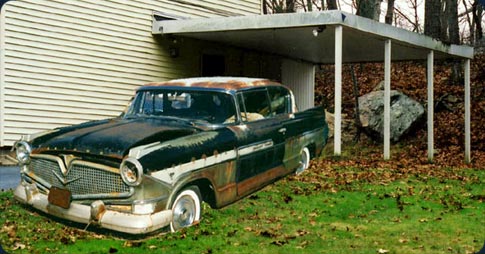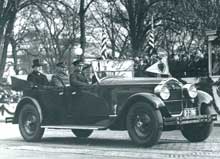Staying Warm
It was cold in Washington, DC, this week, as the nation inaugurated our 44th President. For President Obama and his entourage there was no discomfort, as their new hermetically-sealed Cadillac limos kept them warm and dry. For the millions on the mall, however, it was shivers and shakes as the thermometer hovered in the high 20s. There was a time, however, when presidents and public alike braved the cold winds.
The photo above is not an inauguration picture, but it is presidential. The man in the top hat is Calvin Coolidge, who served from the death of Warren Harding in August 1923 until the inauguration of Herbert Hoover in March 1929. I'm not sure about his passenger and presumptive guest, but he looks rather like Joseph Stalin, then establishing his power in the Soviet Union after the death of Lenin (see update below). The license plate dates the photo to 1925, and the car is not an official White House convenyance but a '24 Packard Single Eight running on DC dealer plates. Cool Cal and his guest are bracing against the wind, but the car is comfy warm thanks to its Pines Winterfront.
The Pines Winterfront Co. of Chicago manufactured thermostatically controlled radiator shutters. Invented by James Raleigh in the early 1920s, the Winterfront had a thermostat that pressed against the radiator core. When cold, its shutters cut off air flow, allowing the engine to warm up. When warmed up (I've read that the threshold was 130 degrees F, appropriate in the days of alcohol-based antifreeze with a low boiling point), the thermostat operated levers that opened the louvers. Winterfronts were sometimes made in universal generic form, like this display discovered by Eric Minoff, webmeister of the long-slumbering blog Cars at Large, at the National Automobile Museum in Reno, Nevada. Others were shaped for a custom fit to their cars. Dan Strohl, protagonist at the Hemmings Blog and an inspired young pundit who gives us hope for the new breed of automotive journalists, came across a Peerless-badged Winterfront at Hershey in 2007. A trash can special, it was shaped specially to conform to the radiator of the 1926-28 models, much as the presidential Winterfront was tailored to the Packard's hallmark shell. Dan has since sold his Winterfront to a passionate Peerless partisan. In the early 1930s, some manufacturers used Pines thermostats to operate the shutters on their OEM radiator grilles.
Other automakers stuck with the pure and simple. Angus, my 1925 Hudson, has manually-operated louvers. A rod from the dashboard enables the driver to move them from open to shut, but one must watch the temperature gauge in order to regulate properly. Hudson built them into the radiator shell, but others, like this 1926 Nash, used a manual aftermarket unit.
Some time in the 1930s, manufacturers began to install thermostats inside their engines (does anyone know who was first, and when?). Thereafter, the need for Winterfronts faded. Eric notes that you never see Winterfronts on collector cars today. While they might be considered the ultimate accessory, they're useless on cars that are seldom driven in cold weather. Moreover, even those that are an exact fit to the radiator inevitably compromise the car's looks.
UPDATE: Dennis David points out that a better candidate for the mystery General is John "Black Jack" Pershing, then General of the Armies. It did occur to me that Stalin was unlikely to be in Washington in 1925 - the US didn't recognize the USSR until 1933. Does the flag on the car tell us more? Cropped out of the big picture is a reviewing kiosk or shelter bearing the general form of the Seal of the United States of America. So what was this event?

